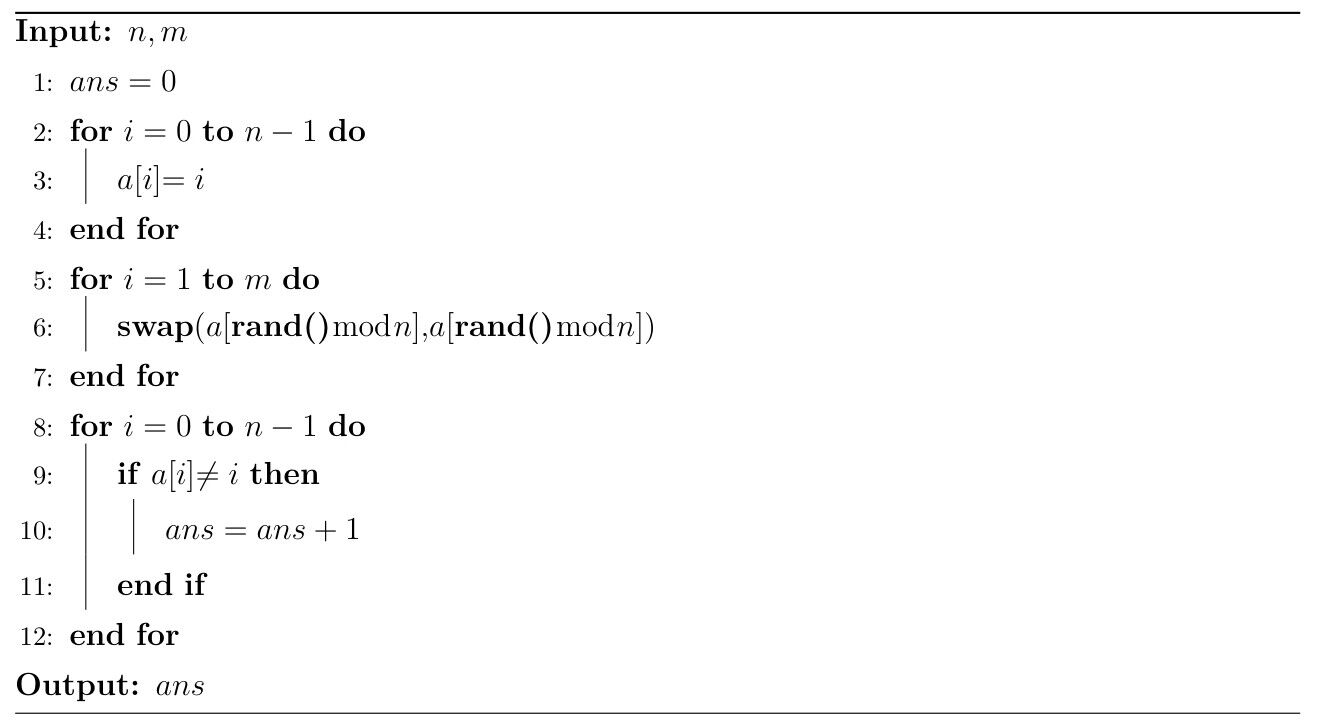
| Online Judge | Online Exercise | Online Teaching | Online Contests | Exercise Author |
|
F.A.Q Hand In Hand Online Acmers |
Best Coder beta VIP | STD Contests DIY | Web-DIY beta |
Data Generation
Time Limit: 2000/1000 MS (Java/Others) Memory Limit: 65536/65536 K (Java/Others)Total Submission(s): 629 Accepted Submission(s): 236
Problem Description
Yoshinow2001 is making data for his problem. He wants to generate a random permutation of $\lbrace 0,\dots,n-1\rbrace$ , so he used the following algorithm:

Here, we can assume that the function $rand() \bmod n$ is able to generate integer randomly in the set $\lbrace 0,\dots,n-1\rbrace$ with equal probability.
Now Yoshinow2001 is concerned that this algorithm is not random enough ------ after all, if you want to randomize a permutation, the expected number of elements for $a_i\neq i$ should be $n-1$. So he wants to ask what the mathematical expectation of the final $ans$ is.

Here, we can assume that the function $rand() \bmod n$ is able to generate integer randomly in the set $\lbrace 0,\dots,n-1\rbrace$ with equal probability.
Now Yoshinow2001 is concerned that this algorithm is not random enough ------ after all, if you want to randomize a permutation, the expected number of elements for $a_i\neq i$ should be $n-1$. So he wants to ask what the mathematical expectation of the final $ans$ is.
Input
The first line of input is a positive integer $T(1\leq T\leq 10^5)$ representing the number of data cases.
For each cases consists of a single line of two integers $n,m$, separated by a space.
Where $1\leq n\leq 10^{18}$,$0\leq m\leq 10^{18}$, ensure that $n$ is not a multiple of $998\ 244\ 353$.
For each cases consists of a single line of two integers $n,m$, separated by a space.
Where $1\leq n\leq 10^{18}$,$0\leq m\leq 10^{18}$, ensure that $n$ is not a multiple of $998\ 244\ 353$.
Output
For each cases, output a line with a positive integer representing the answer $\bmod 998\ 244\ 353$.
Sample Input
3 1 0 1 1 2 1
Sample Output
0 0 1
Source
| Home | Top |
Hangzhou Dianzi University Online Judge 3.0 Copyright © 2005-2024 HDU ACM Team. All Rights Reserved. Designer & Developer : Wang Rongtao LinLe GaoJie GanLu Total 0.000000(s) query 1, Server time : 2024-11-26 07:09:35, Gzip enabled |
Administration |